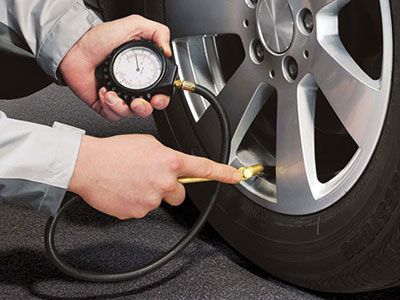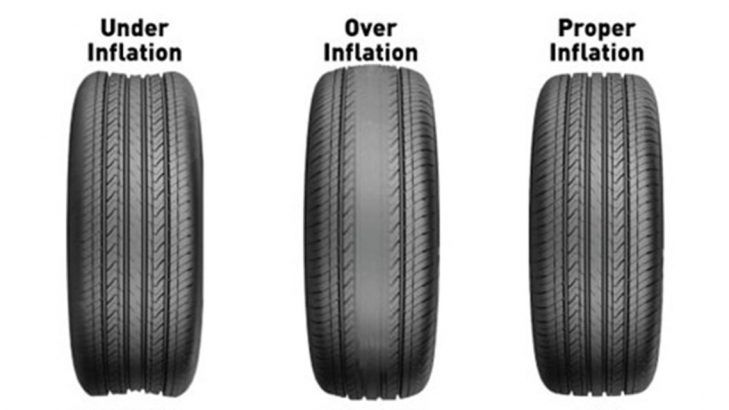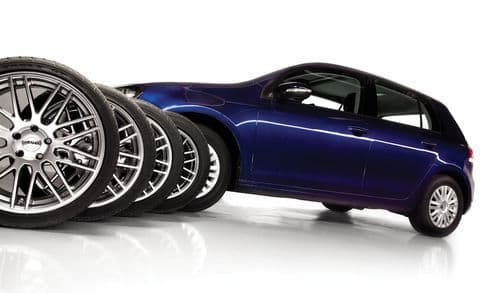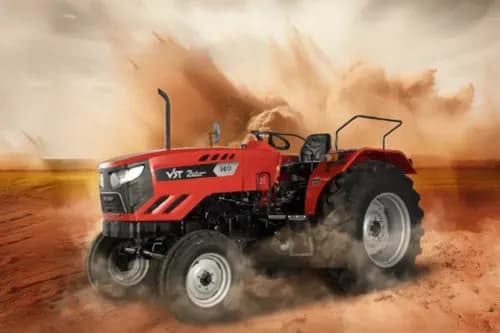Ad
Ad
Ad
Tyre Pressure – Under and Over Inflation/ Tyre Pressure Calculator
Posted by Admin On 05-Jun-2022 11:59 AM

In day to day drive, it is very simple to limit the performance of your vehicle's tyres. In any case, if you neglect the tyres for a really long time, you will not only face inconvenience but also risk lives. It isn't about just your wellbeing or of the people who are travelling along with you but about others as well who are on the road. One of the most important things that need to be checked from time to time is the Tyre Pressure.
Tyre pressure is the air pressure inside a tyre. It is very important to check whether your tyres are properly inflated or not. Under-inflation is one of the major causes of tyre failure. When your tyres are under-inflated, the pressure in the tyre is distributed unequally. The part which has less pressure, become saggy and creates friction with the ground while rotation. This tends to heat up the tyre which can cause early wear and tear, puncture and even blowout. In order to prevent such a situation, check whether your tyres are properly bloated or not.
Before we reveal to you why it is critical to screen the tyre pressure, you should comprehend that tyre pressure is the measure of air inside the vehicle's tyres, and is estimated in psi. You can either keep an electronic tyre pressure gauge or can get the tyres checked at a fuel station.
- If the tyre weight is incorrect, it not only creates a negative impact on the vehicle's capacity to break, but also it affects the soundness and the fuel-efficiency.
- High weight shields the tyre from having enough hold on the ground, which in turn can lead the vehicle to bounce savagely while ignoring knocks and potholes.
- High weight additionally infers loss of traction, which can impact the responsiveness of the vehicle's brakes.
- Low weight implies a lot of the tyre's surface will contact the ground, which implies increased rubbing. Expanded erosion makes the tyre to heat up, which, thus, destroys the tread too rapidly.
Inadequate pressure can lead to under-inflation as well as over-inflation. Both the situations are not good for the tyre. Let’s look at the disadvantages of both of them:

Under-inflated tyres:
- Under-inflated tyre flattens and in turn, loses steering precision.
- Due to increased friction tyre starts heating up.
- Tyres with less air become more prone to punctures and blowouts.
Over-inflated tyres:
- An over-inflated tyre becomes very stiff giving bumps during the ride.
- Tyres with less air reduce their contact with the road which is not good especially in wet surface and snow.
- Tyre becomes more prone to damage in kerbs and potholes when over inflated.
What is the correct Tyre Pressure?
The right tyre pressure is set by the vehicle producer itself. Therefore, you can discover what is the right air pressure for your vehicle from the vehicle handbook. The right air pressure is also written inside the fuel cap cover and inside the driver's door as well.
The balancing of the tyres should be done according to the by the tyre’s load-bearing capacity.
Tyres should be set to the right air pressure when the tyre is cold or possibly cool. Driving a tyre for less than 2 miles in a slow pace can be viewed as cool. In the event that the tyres are hot and there is no alternative to enable them to chill off you can expand them, yet add 4 to 5 PSI more than the suggested air pressure. When you have finished your drive you ought to enable the tyre to cool down and re-check and modify it to the right weight.
When should the Tyre Pressure be checked?
A few makers suggest that the tyres should be checked each month and before a long adventure. However, some state that checking them on a week by week premise is a sheltered technique too as this gives some an opportunity to take a look at the condition, wear and any harm that may have happened.
In typical driving, and if your tyre weight is set effectively, it can change somewhere in the range of 6 and 8 PSI. This is quite normal and the tyre is intended to work securely under these fluctuations of weight.
An under pressured tyre is more difficult to handle while you steer, as it can cause redirection in the heading (back controlling) which can be sudden and un-recoverable. It will expand the moving rubbing with the street surface which thus requires more vitality from the engine along these lines utilizing more fuel. The temperature of the tyre will also increase as the tyre weight decreases, the sidewall may begin to disfigure, producing warmth to a point that the packaging may bomb calamitously. The tyre tends to wear out and destroy speedier than that of a tyre at the right weight. If the tyre’s sidewall is getting hotter after a short voyage, it means that the tyre is wearing out on the edges of the tyre more than the inside.
An over swelled tyre will offer less hold on the surface, and your vehicle will be vulnerable to sliding superficially. The tread, which is for pushing water out from underneath the wheel, can't work legitimately and in wet conditions aquaplaning may happen.
Tyre Pressure Calculator
A Tyre Pressure monitoring calculator is a tool that helps in knowing the right tyre pressure of your tyre. All you need to do is select the variant of your car or bike and in less than a few seconds you will know the right air pressure for your tyres.
Ad
Ad
Ad
Ad
Registered Office Address
Delente Technologies Pvt. Ltd.
M3M Cosmopolitan, 12th Cosmopolitan,
Golf Course Ext Rd, Sector 66, Gurugram, Haryana
pincode - 122002
Join CMV360
Receive pricing updates, buying tips & more!
Follow Us
COMMERCIAL VEHICLE BUYING BECOMES EASY AT CMV360
CMV360 - is a leading commercial vehicle marketplace. We helps consumers to Buy, Finance, Insure and Service their commercial vehicles.
We bring great transparency on pricing, information and comparison of tractors, trucks, buses and three wheelers.













